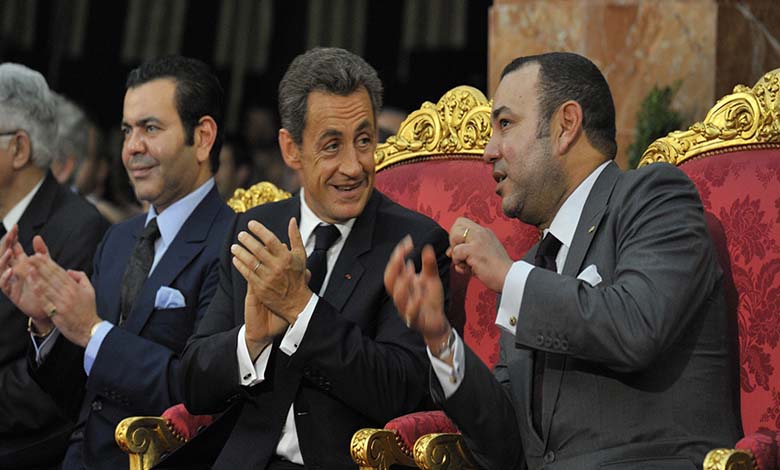Sarkozy: The strength of Morocco lies in the intelligence of King Mohammed VI in reconciling identity and modernity
Belgium renews its confirmation of its position on the Moroccan Sahara, considering that the autonomy plan is fundamentally good for reaching an acceptable solution by all parties

Former French President Nicolas Sarkozy presented a clear stance by acknowledging the just cause of Morocco and its right to sovereignty over its entire territory, including the new regions. He expressed great admiration for King Mohammed VI, considering him an “exceptional man and one of the great wise and visionary leaders,” referring to the unprecedented achievements in the kingdom in recent years.
Sarkozy analyzed the current state of the world and its major geostrategic issues during the presentation of his latest book titled “The Time of Battles,” attended by numerous distinguished figures from the political, diplomatic, economic, and cultural fields. He emphasized that Morocco’s strength lies in the intelligence of King Mohammed VI in reconciling identity and modernity, expressing admiration for the King’s ability to anticipate events and continue his vision for the kingdom, highlighting the “enormous progress” made by Morocco in various fields.
Sarkozy explained that it is about “a country that respects its culture and history, embracing modernity at the same time. If there is a place where the issue of identity holds a central place, it is here: (the state of Morocco) represents openness, not closure.”
The former French president revealed in his book the relationships he had with African presidents and others from the Maghreb region. He stated that “Morocco succeeded in entering the modern world without cutting ties with its lifestyle, traditions, and its unique world.” He added that there are “exceptional relations” between Morocco and France, friendly countries, saying, “We share the same interests and links, and we are very different but very close.”
As with all political and diplomatic occasions, the issue of the Moroccan Sahara takes priority for Rabat, which intensifies its efforts to gain international recognition of its rights. Sarkozy, on this occasion, said, “France has always been at the forefront of the Sahara issue. It has always considered that there is only one credible solution, which is the solution proposed by Morocco.” He added, “I am convinced of the Moroccanness of the Sahara. It is a position I have always defended: the position of openness and development,” expressing hope that Europe can fully acknowledge this reality, just as the United States did.
Sarkozy had previously criticized the relationship between his country and Algeria, expressing concern last August about the impact of efforts to improve Paris’s relations with Algeria on the relationship with Morocco, which also faces difficulties. He said, “This approach distances us from Morocco. We risk losing everything. We do not gain the trust of Algeria, and we lose the trust of Morocco.” He urged President Emmanuel Macron not to attempt to “build an artificial friendship” with Algerian leaders and to be aware of the danger of deteriorating relations between Paris and Rabat.
In commenting on his new book, Sarkozy said, “I supported President Macron in the last presidential elections. This does not mean that we agree on everything.” He added, “Let us not try to build an artificial friendship with Algerian leaders who systematically use France as a scapegoat to justify their failures and lack of legitimacy.” He concluded, “They will always refuse. They desperately need to divert attention from the failure they have plunged their country into by regularly blaming France for all the evils.”
Sarkozy’s position aligns with that of many European countries that found the Moroccan proposal to be the only one capable of resolving the fabricated conflict in the Sahara. Belgium has renewed its confirmation of its position on this issue, considering Morocco’s autonomy plan, presented by the kingdom in 2007, as a “serious and credible effort and a fundamentally good basis for reaching an acceptable solution by the parties,” as stated in the joint announcement issued on October 20, 2022.
This position, reaffirmed by a spokesperson for the Belgian Ministry of Foreign Affairs, in a statement to the Maghreb Arab News Agency, refers to the joint announcement issued on October 20, 2022, adopted following a meeting between Moroccan Minister of Foreign Affairs Nasser Bourita and Belgian Minister of Foreign Affairs and European and Foreign Trade H.E. Lahlou Habib.
H.E. Lahlou confirmed “Belgium’s long-standing support for the series sponsored by the United Nations to reach a fair, permanent, and acceptable political solution by the parties.” In this joint announcement, “the two ministers agree on the exclusive competence of the United Nations in overseeing the political process and reaffirm their support for UN Security Council Resolution 2602, which emphasizes the role and responsibility of the parties in seeking a realistic, practical, permanent, and consensus-based political solution.”
Morocco and Belgium welcomed the appointment of the Personal Envoy of the Secretary-General of the United Nations, Staffan de Mistura, and once again affirmed their active support for his efforts to advance the political process based on relevant UN Security Council resolutions and the MINURSO mission.
The joint announcement issued on October 20, 2022, “confirms the position adopted by Belgium in 2014 within the framework of the Joint High Commission between Morocco and Belgium,” previously expressed by then-Prime Minister Elio Di Rupo. It stressed that “Belgium appreciates the serious and credible efforts made by Morocco to achieve this goal, especially through the presentation of its autonomy plan.” It added that this position is in line with the principles mentioned in the latest resolution of the UN Security Council regarding the issue of the Sahara, namely Resolution 2703 issued on October 30, 2023.












